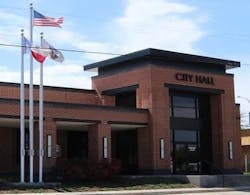Major Winter Storm No Match for Smart Utility Network
About the author:
Trey Overman is the Director of Global Residential Water Product Management at Sensus, a Xylem brand. Overman has four years of experience in the water industry. He holds undergraduate degrees from Appalachian State University and an MBA from the University of North Carolina at Chapel Hill.
After a year of unprecedented events around the world, 2021 kicked off in similar fashion. A historic winter storm blanketed the entire Lone Star state in ice, leaving many Texans without electricity and water for several days in mid-February.
With temperatures plunging to single digits, the February freeze put the state’s water utility system to the test, revealing the need for resilient technology in the face of a true weather emergency.
The city of Jacksonville was well-equipped to respond. Jacksonville’s Water and Sewer Utilities team had upgraded its aging system to a smart utility network just two years prior to Storm Uri’s descent. Not until this moment did the city realize just how critical that decision in 2019 had been.
A Crisis Emerges
With temperatures well below 10°F, many Texans were bundled up inside their homes, coping with loss of power caused by the cold snap. Even access to clean water was in question, due to burst, frozen pipes.
“We were pumping nearly double what the water consumption was normally, we were losing almost more water than we could produce, and we were getting ourselves into some critical situations,” said former Jacksonville City Manager Greg Smith.
Preparedness Prevails
Quickly springing into action, the city’s utility team used the Sensus ally water meter and two-way FlexNet communication network to run timely usage reports that discovered some customers were losing up to 28,000 gallons of water per day, compared to normal daily consumption of 100 gallons. Fortunately, the city was able to remotely and strategically shut off water distribution to residential customers with its smart technology, protecting homes against flood damage from burst pipes.
“You have five days of sub-freezing temperatures in Texas; that’s not normal,” said Smith. “Our infrastructure is not designed for that. The fact that we were able to proactively turn off water, I know saved us millions of gallons of water. I think we probably saved millions of dollars in property damage as well.”
The meter’s integrated pressure sensor remotely identified issues around the entire city and allowed the team to isolate water main and service line breaks. They identified and responded to approximately 65 issues — half of which were detected by data provided through the smart water meters.
“The fact that you can see pressure on this meter across the city is invaluable in your daily operations, but when you get to a storm like what we had, there was so much information that it made all the difference in the world,” said Smith.
Timely Data Leads to Recovery
According to Smith, without remotely-managed smart meter capabilities, it takes 30 minutes to an hour to turn off and turn on water meters. Under approximately 8 inches of snow, he guesses that time would have tripled. But the city of Jacksonville responded to the majority of requests in only two to three minutes because of the system’s remote shutoff capability. Within just 72 hours, the city identified damage, responded to its customers and repaired its water distribution system.
“These meters saved us during the winter storm,” said Smith. “They made the difference from us being like a lot of other utilities, where the entire city is out of water, versus being a city that had very limited to no water outages.”
As the city began to thaw, the system’s data also helped resume normal water service. The city’s utility team used analytics to differentiate storm-related damage from typical water use which resulted in the creation of an amnesty policy for those impacted by high water bills in February.
“Even after the storm, the benefits of our smart water technology prevailed,” said Smith. “Because we had such precise data, the city was able to set a policy and understand the financial impact to the city and residents of the winter storm.”
Open communication with the city’s residents was another important aspect of the recovery process. The online Sensus Customer Portal was developed to create greater transparency between utilities and customers and allows customers to track their water consumption and set alerts should their usage spike. Customers who opted in the online portal could detect if their consumption corresponded to any issues during the week of the deep freeze.
Jacksonville’s Leadership is Rewarded
Jacksonville was among the first cities in the U.S. to switch 100% of its residential water meters to the ally meter. As a result, it was able to provide exemplary customer service during this winter weather emergency. Ultimately, Jacksonville’s leadership earned it the 2021 Texas Municipal League (TML) Excellence Award, which recognizes municipalities for innovative problem-solving, excellent management and high levels of service.
“We had no idea when we upgraded the system, the level of customer service that it was going to give us the week of February 14, 2021,” said Smith.
RELATED: What is Advanced Metering Infrastructure?
The Value of Reliable Service
Just two years prior to this unforeseen winter weather, the Jacksonville leadership knew it needed a modernization effort, with the majority of its meters nearing a 20-year life span. While the purpose of the system upgrade was not initially to address storm resilience, the remotely managed network more than proved its value when inclement weather covered their service territory.
“The infrastructure we put in worked flawlessly during the worst time,” said Smith. “Our failure rate using these meters was zero. We did not have to go out and replace any meters due to the sub-freezing temperatures. That’s almost a miracle.”
The city of Jacksonville was prepared to respond to a crisis because it was equipped with resilient, storm-tested technology.
“Without the Xylem system, the entire city could have been without water, and our response would have been totally different,” said Smith. “The system paid for itself in just that one week.”
The biggest benefit of the system: renewed trust with customers and confidence in a resilient, reliable, smart utility network for years to come.


